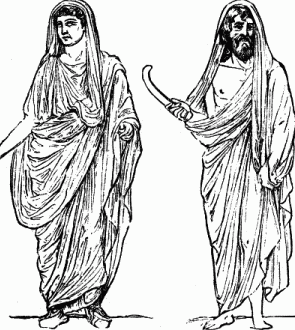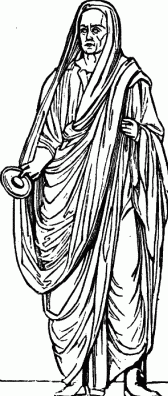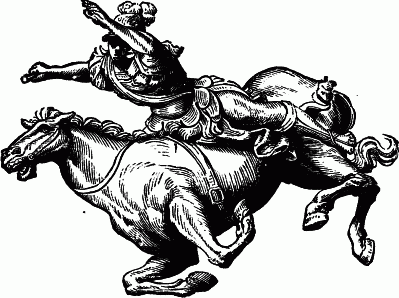
All the old enemies of Rome attacked her again when she was weak and rising out of her ruins, but Camillus had wisely persuaded the Romans to add the people of Veii, Capena, and Falerii to the number of their citizens, making four more tribes; and this addition to their numbers helped them beat off their foes.
But this enlarged the number of the plebeians, and enabled them to make their claims more heard. Moreover, the old quarrel between poor and rich, debtor and creditor, broke out again. Those who had saved their treasure in the time of the sack had made loans to those who had lost to enable them to build their houses and stock their farms again, and after a time they called loudly for payment, and when it was not forthcoming had the debtors seized to be sold as slaves. Camillus himself was one of the hardest creditors of all, and the barracks where slaves were placed to be sold were full of citizens.

Marcus Manlius Capitolinus was full of pity, and raised money to redeem four hundred of them, trying with all his might to get the law changed and to save the rest; but the rich men and the patricians thought he acted only out of jealousy of Camillus, and to get up a party for himself. They said he was raising a sedition, and Publius Cornelius Cossus was named Dictator to put it down. Manlius was seized and put into chains, but released again. At last the rich men bought over two of the tribunes to accuse him of wanting to make himself a king, and this hated title turned all the people against their friend, so that the general cry sentenced him to be cast down from the top of the Tarpeian rock; his house on the Capitol was overthrown, and his family declared that no son of their house should ever again bear the name of Manlius.

Yet the plebeians were making their way, and at last succeeded in gaining the plebeian magistracies and equal honors with the patricians. A curious story is told of the cause of the last effort which gained the day. A patrician named Fabius Ambustus had two daughters, one of whom he gave in marriage to Servius Sulpicius, a patrician and military tribune, the other to Licinius Stolo. One day, when Stolo's wife was visiting her sister, there was a great noise and thundering at the gates which frightened her, until the other Fabii said it was only her husband coming home from the Forum attended by his lictors and clients, laughing at her ignorance and alarm, until a whole troop of the clients came in to pay their court to the tribune's wife.
Stolo's wife went home angry and vexed, and reproached her husband and her father for not having made her equal with her sister, and so wrought on them that they put themselves at the head of the movement in favor of the plebeians; and Licinius and another young plebeian named Lucius Sextius, being elected year after year tribunes of the people, went on every time saying Veto to whatever was proposed by anybody, and giving out that they should go on doing so till three measures were carried—viz., that interest on debt should not be demanded; that no citizen should possess more than three hundred and twenty acres of the public land, or feed more than a certain quantity of cattle on the public pastures; and, lastly, that one of the two consuls should always be a plebeian.
They went on for eight years, always elected by the people and always stopping everything. At last there was another inroad of the Gauls expected, and Camillus, though eighty years old, was for the fifth time chosen Dictator, and gained a great victory upon the banks of the Anio. The Senate begged him to continue Dictator till he could set their affairs to rights, and he vowed to build a temple to Concord if he could succeed. He saw indeed that it was time to yield, and persuaded the Senate to think so; so that at last, in the year 367, Sextius was elected consul, together with a patrician, Æmilius. Even then the Senate would not receive Sextius till he was introduced by Camillus. From this time the patricians and plebeians were on an equal footing as far as regarded the magistracies, but the priesthood could belong only to the patricians. Camillus lived to a great age, and was honored as having three times saved his country. He died at last of a terrible pestilence which raged in Rome in the year 365.
The priests recommended that they should invite the players from Etruria to perform a drama in honor of the feats of the gods, and this was the beginning of play-acting in Rome.
Not long after there yawned a terrible chasm in the Forum, most likely from an earthquake, but nothing seemed to fill it up, and the priests and augurs consulted their oracles about it. These made answer that it would only close on receiving of what was most precious. Gold and jewels were thrown in, but it still seemed bottomless, and at last the augurs declared that it was courage that was the most precious thing in Rome. Thereupon a patrician youth named Marcus Curtius decked himself in his choicest robes, put on his armor, took his shield, sword, and spear, mounted his horse, and leapt headlong into the gulf, thus giving it the most precious of all things, courage and self-devotion. After this one story says it closed of itself, another that it became easy to fill it up with earth.
The Romans thought that such a sacrifice must please the gods and bring them success in their battles; but in the war with the Hernici that was now being waged the plebeian consul was killed, and no doubt there was much difficulty in getting the patricians to obey a plebeian properly, for in the course of the next twenty years it was necessary fourteen times to appoint a Dictator for the defence of the state, so that it is plain there must have been many alarms and much difficulty in enforcing discipline; but, on the whole, success was with Rome, and the neighboring tribes grew weaker.
